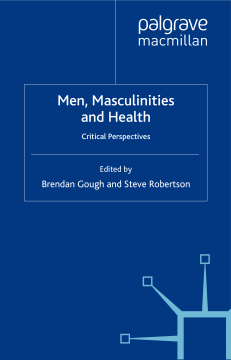
Additional Information
Book Details
Abstract
Men drink too much alcohol, eat unhealthy food and avoid going to the doctors until they are seriously ill. Indeed, some say being masculine is bad for men's health. But is the situation so simple?
This deeply engaging book explores both the psychological and sociological factors that affect men and their health. It investigates how notions of 'maleness' impact on the individual's approach to health and take-up of services, and provides clear foundations for best practice in care.
Part 1 of the book explores and sets the theoretical scene. It asks why disparate fields have not previously been brought together and what theoretical frameworks could be utilised to assist in this process. Parts 2 and 3 consider empirical work in relation to men, health and illness, providing critical rather than simply descriptive accounts.
Bringing together an international collection of contributors, Men, Masculinities and Health provides fresh ideas for practice; creating a fertile terrain for future debate that will excite all those interested in gender issues.
BRENDAN GOUGH is Professor of Applied Social Psychology at Nottingham Trent University, UK. He is a critical social psychologist and qualitative researcher interested in gender issues, especially concerning men and masculinities. He has published
various papers on gender identities and relations which draw upon discursive and psychoanalytic concepts, including areas such as sexism, homophobia and intersex. He has also published papers on ESRC funded health-related research, such as alcohol consumption, smoking and aspects of men's health. He is co-editor of Qualitative Research& Psychology and Social Psychology& Personality Compass (the Critical Psychology Section).
STEVE ROBERTSON is currently Reader in Men's Health at the Centre for Men's Health, Leeds Metropolitan University, UK. He worked as a nurse and health visitor for over 15 years before commencing a research career, completing his PhD at the Institute for Health Research, Lancaster University. He has been publishing in the men's health field, particularly in men's health promotion, for over 14 years and is author of Understanding Men and Health: Masculinities, Identity and Well-Being (2007). He is best known for his work linking theories of masculinities to concepts of health and illness and has collaborated on published work in this area with colleagues in Australia, Canada and the United States.
This important new book provides a critical and interdisciplinary look at the role masculinity can play in men's relationships with health. Bringing together international contributors from previously disparate fields of study, it links theory with empirical research to create a fertile terrain for future debate.
Table of Contents
| Section Title | Page | Action | Price |
|---|---|---|---|
| Cover | Cover | ||
| Contents | vii | ||
| Foreword | ix | ||
| Acknowledgements | xii | ||
| Notes on Contributors | xiv | ||
| Introduction: What Is the Point of this Book? | 1 | ||
| Part 1 Current Issues and Debates in the Field of Men's Health and Masculinity | 9 | ||
| 1 Developing a Critical Men's Health Debate in Academic Scholarship | 11 | ||
| 2 A Grand Illusion: Masculinity, 'Passing' and Men's Health | 30 | ||
| 3 Men, Public Health and Health Promotion: Towards a Critically Structural and Embodied Understanding | 48 | ||
| 4 Bugging the Cone of Silence with Men's Health Interviews | 67 | ||
| Part 2 Popular Conceptions of Men's Health and Well-Being | 91 | ||
| 5 Men's Negotiations of a 'Legitimate' Self-Help Group Identity | 93 | ||
| 6 Older Men's Health: The Role of Marital Status and Masculinities | 109 | ||
| 7 Promoting 'Masculinity' over Health: A Critical Analysis of Men's Health Promotion with Particular Reference to an Obesity Reduction 'Manual' | 125 | ||
| 8 The Health Experiences of African-Caribbean and White Working-Class Fathers | 143 | ||
| Part 3 Men, Masculinities and Illness | 159 | ||
| 9 Pathologising Fatherhood: The Case of Male Post-Natal Depression in Britain | 161 | ||
| 10 Prostate Cancer and Masculinities in Australia | 178 | ||
| 11 Understanding Masculinities within the Context of Men, Body Image and Eating Disorders | 198 | ||
| 12 The Role of Masculinities in White and South Asian Men's Help-Seeking Behaviour for Cardiac Chest Pain | 216 | ||
| Afterword: What Next for Men's Health Research? | 232 | ||
| Index | 237 | ||
| A | 237 | ||
| B | 237 | ||
| C | 238 | ||
| D | 239 | ||
| E | 240 | ||
| F | 240 | ||
| G | 241 | ||
| H | 242 | ||
| I | 243 | ||
| J | 244 | ||
| K | 244 | ||
| L | 244 | ||
| M | 245 | ||
| N | 246 | ||
| O | 246 | ||
| P | 247 | ||
| Q | 248 | ||
| R | 248 | ||
| S | 248 | ||
| T | 250 | ||
| U | 250 | ||
| V | 250 | ||
| W | 250 | ||
| Y | 251 | ||
| Z | 251 |
